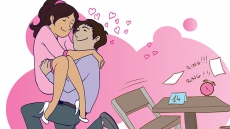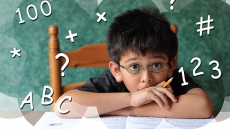The human-animal bond is no new phenomenon, with approximately 60 per cent of Canadians owning pets. From the young to the old, pets offer an array of contributions on both an individual and familial level..
The Hare and the Tortoise, The Three Little Pigs, Goldilocks and the Three Bears – we have all grown up telling tales through the voice, eyes or perception of animals. Animals can provide us with a new lens with which to view the world, or perhaps the ability to express ourselves, both through them and to them. The human-animal bond is no new phenomenon, with approximately 60 per cent of Canadians owning pets. From the young to the old, pets offer an array of contributions on both an individual and familial level. A friendly fin, paw or claw can go a long way in defining a person.

Veterinarian Himani Kundlas points out that pets are now considered therapy animals, helping in the healing of people. Surely, pets can come with designated therapeutic roles such as physical rehabilitation, impairment assistance, and condition detection. Most importantly, however, pets are companion animals that add value to one’s quality of life. Long-time bird owner, Parabjot Kaur shares a simple thought behind the reason for a fluffy entry to her house, “I got my bird because I felt like it would be fun to have a non-human living at our house.” Ironically, it is precisely this element of not being human, yet having life, that becomes the foundation of a powerful bond.

According to Rustin Moore, DVM, PhD Diplomate ACVS. Dean, College of Veterinary Medicine, even in situations of homelessness or domestic violence, people will not give up their pets. Simply put, pets are good for our physical, emotional and mental health. From a physical standpoint, pets get us moving! For example, dog owners are reported to have a decreased risk of heart disease given that they have lower blood pressure and cholesterol levels, as dogs require daily physical activity. Some studies show that babies who are exposed to an atmosphere with pets have a lower likelihood of developing allergies and generally develop a stronger immune system. Gurbaz Singh, new owner of a German Shepherd dog, puts forth his experiences, “Dogs demand responsibility and constant energy. It isn’t just the daily walking, but also the need to socialize him with other people and dogs, in addition to playing with him so that he’s engaged in activity.”

Moreover, pets are shown to reduce anxiety and regulate stress, creating a relaxed and welcoming atmosphere. The sole act of caring for another life – one that is wholeheartedly accepting of you the way you are – provides a sense of fulfillment. Many people even talk to their pets as a way of self-healing. Pet owners are known to have lesser experiences of isolation and loneliness, which not only soothes the owner, but also the pet. Veterinarian Dr. Hakam Bhullar, while previously sharing his story of practice in Canada, references his love for animals and the healing power they possess as the central driving force behind his passion for his career.
Of course, pets also showcase sadness when owners are upset and happiness when owners reflect joy. Dog trainer and breeder, Kuldip Singh Takhar, shines light on the inherently protective tendencies of dogs, “Upon sight of unfamiliar people, dogs often bark to depict protection – of their property, yard, and owners.”

Interestingly, pets are also catalysts of social engagements with other people. Asking about someone else’s pet can often be a great conversation starter, igniting new connections, and strengthening existing ones. “My budgie is not only mine. In fact, my entire family loves her unconditionally. Whenever she does something funny or new, everybody in the family notices. This brings us closer because we share our budgie’s new habits with one other,” says Parabjot. Pets make it easier for us to reach out to others around us, in situations that might otherwise prove to be not as invitational. As pets help us become better versions of ourselves, it is just as equally important for us to dutifully fill our roles as owners. This begins with extensive research and an evaluation of whether you are equipped with the finances, time, energy and resources to provide a life for your pet that allows it to thrive, not just survive. The need to match the right pet with the right owner should not be underestimated.
Takhar brings up the three Bs when making a decision: (a) breed selection that fits your lifestyle, (b) a breeder that is reputed/certified, and (c) a budget that ensures a registered dog. Further, Dr. Kundlas encourages people to adopt pets rather than purchasing them. As you then go on to train and teach your new friend, you’ll soon realize that, along the way, they’ve taught you more!

Tips on looking after your pet better
1. Train your pet if they require it. This will provide safety to those that interact with your pet and your pet itself.
2. Ensure that your pet’s food suits their nutritional needs and avoid giving your pet food that may harm them. Food safe for you may not be safe for your pet. Make sure your pet is also getting plenty of water.
3. Clean your pet and their surroundings. It is important to clean out all enclosures, toys, food bowls and washroom destinations. Groom your pet as well; professional services are available if you do not feel equipped.
4. Regular vet visits should be a practice for all pet owners, inclusive of timely neutering/spraying and access to basic vaccinations. It is essential to get routine checkups and take preventative measures, much like you would yourself. 5. Develop a relationship. Give your pet undivided attention and time; affection and warmth are important for their development.

Values you can learn while looking after your pets
- Inputs by Dr. Hakam Bhullar
Discipline and routine
Dogs require a lot more discipline and care. They require scheduled walks to relieve themselves and gain the adequate amount of exercise needed to stay healthy. They require to be fed the amount and times per day as recommended by their veterinarian. Owning a dog causes the family members to discipline themselves towards maintaining a routine, to provide sufficient care towards their pet.
Responsibility
Dog owners often find that their children will gain a special sense of responsibility when the chores concerning the care for the pet are divided. Walking, feeding, training, bathing, doctor appointments, etc. are all responsibilities that require a combined team effort from each family member and individual. Cats often do not display their emotions on their sleeves as much as dogs do normally. Therefore, cat owners are given the strong responsibility of actively caring for their pet and keeping track of its needs and enrichment.
Love and appreciation for living things
From my own experience, I noticed that children do not fully understand the appreciation and love for all living things until they have had the opportunity to have a furry companion as a family member. Children learn to establish empathy and sympathy with other living things more easily. We often refer to our pets as the babies of the family, and our children then gain an understanding of how it is to take care of ‘someone’ more dependent than them in the household.
Image Courtesy: istockphoto, Dr Hakam Bhullar, Dr Himani Kundlas, Kuldip Singh Takhar





